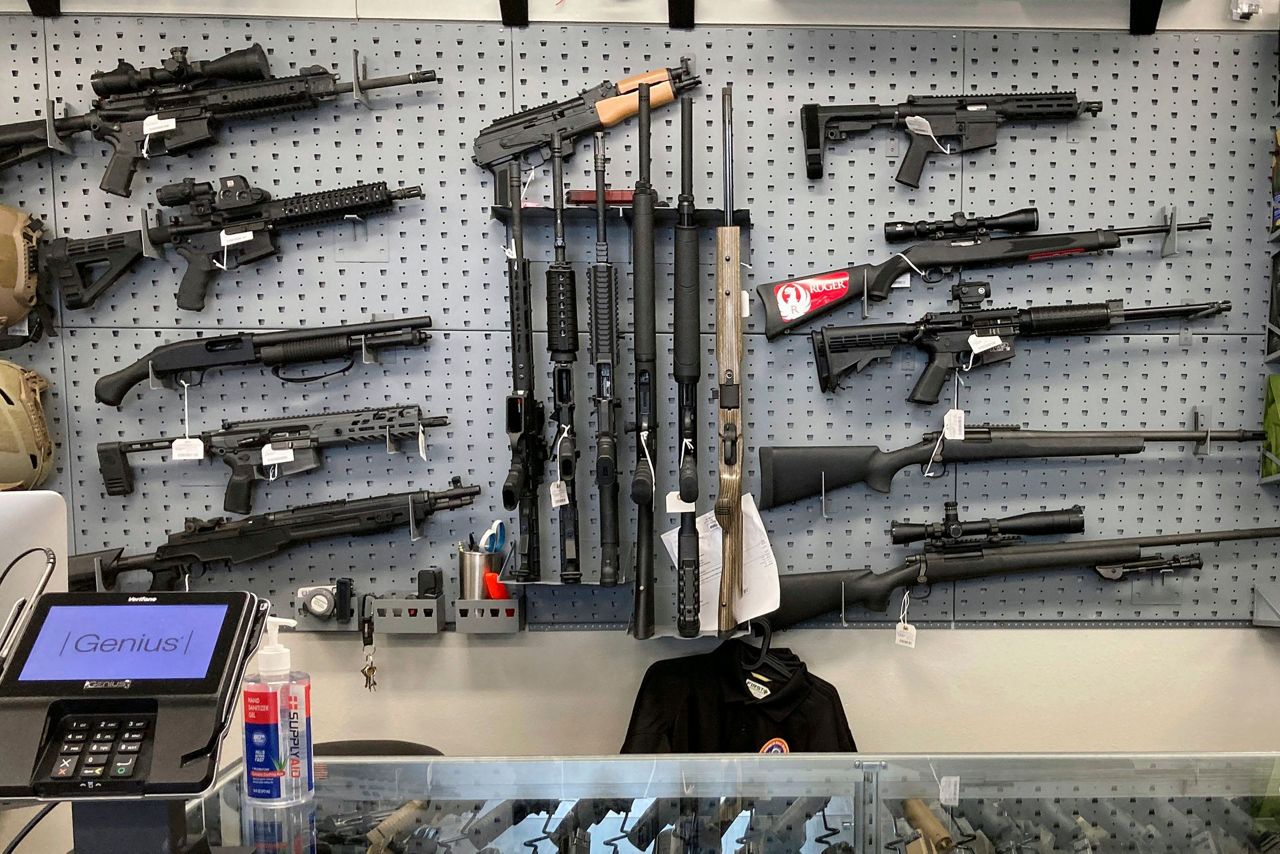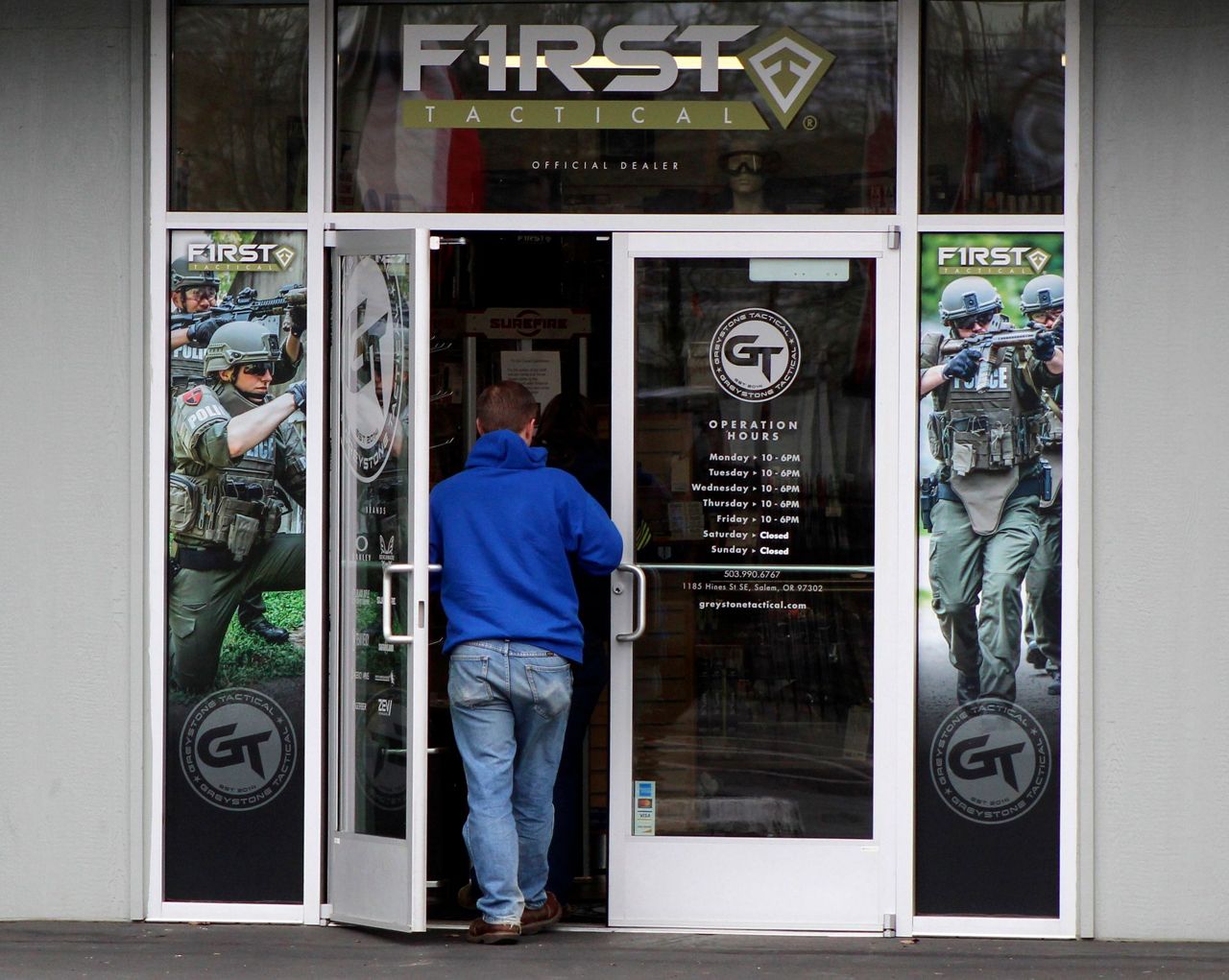PORTLAND, Ore. (AP) — An Oregon judge on Tuesday extended an order blocking a key part of a tough new voter-approved gun law intended to curtail mass shootings, but did not immediately rule on its most controversial part — a ban on the sale and transfer of high-capacity magazines.
Harney County Judge Robert Raschio let stand an earlier temporary restraining order that blocks the permit-to-purchase provision of the law narrowly approved by voters in Oregon in November. He also temporarily blocked another provision that prevents the sale of a gun until the results of a background check come back. Under federal law, a gun sale can proceed by default if the background check takes longer than three business days — the so-called Charleston loophole, because it allowed the assailant to purchase the gun used in a 2015 South Carolina mass shooting.
But after a full day of oral arguments, the judge did not rule on a motion to freeze a ban on gun magazines containing more than 10 rounds while the courts debate the law's constitutionality. Raschio has until Friday to issue a ruling.
The lawsuit, filed by Gun Owners of America Inc., the Gun Owners Foundation and several individual gun owners, seeks to have the entire law placed on hold while it works its way through a spate of legal challenges. Unlike other lawsuits filed against Measure 114, this one specifically makes the claims under the Oregon Constitution, not the U.S. Constitution. Burns, the Harney County town where the hearing took place, is more than 280 miles (450 kilometers) southeast of Portland in a rural and sparsely populated corner of the state.
Prior to Tuesday’s hearing, the state had agreed to delay the permit-to-purchase portion of the law until Feb. 8 because of a lack of certified law enforcement to oversee the in-person gun handling training class that would be required.
“I’m going to continue the temporary restraining order with regards to the permit-to-purchase because I’m convinced that there’s irreparable harm to the right to bear arms,” Raschio said. The order will remain in effect “until I receive notice from defendants that they’re prepared to deploy a permit-to-purchase” system, he added.
Measure 114 requires a permit, criminal background check, fingerprinting and a hands-on training course for new firearms buyers that includes firing the gun with dry or live rounds. It also bans the sale, transfer or import of gun magazines over 10 rounds unless they are owned by law enforcement or a military member or were owned before the measure’s passage. Those who already own high-capacity magazines can only possess them in their homes or use them at a firing range, in shooting competitions or for hunting as allowed by state law after the measure takes effect.
Gun sales and requests for background checks soared in the weeks since the measure was approved because of fears the new law would prevent or significantly delay the purchase of new firearms under the permitting system.
Multiple gun rights groups, local sheriffs and gun store owners have sued, saying the law violates Americans’ constitutional right to bear arms and legal wrangling is likely to continue for months — or years — in this case and the others.
The law’s fate is being carefully watched by both gun rights advocates and those who want stricter limits on gun ownership. It would be one of the first to take effect after a U.S. Supreme Court ruling in June that struck down a New York law that placed limits on carrying guns outside the home.
The June ruling signaled a shift in the way the nation’s high court will evaluate Second Amendment infringement claims, with the Supreme Court’s conservative majority finding judges should no longer consider whether the law serves public interests like enhancing public safety.
Instead, judges should only weigh whether the law is “consistent with the Second Amendment’s text and historical understanding.”
The legal focus Tuesday in state court was focused on the historical context when Oregon’s constitution was enacted, and on the firearms landscape at that time. The Oregon Constitution was enacted in 1859, nearly 70 years after the Second Amendment of the U.S. Constitution was ratified.
Plaintiff expert witnesses testified that guns with a multi-shot capacity — pre-cursors of today's high-capacity magazine weapons — were common when the Oregon Constitution was adopted and would have been familiar to its drafters.
But the state Attorney General's office called witnesses who refuted that firearms with high-capacity magazines were common at that time and would have been “curiosities or exotic weapons" making up about 0.2% of all gun ownership.
Expert witnesses also addressed how the new law would impact gun sales and availability in the state.
The owner of a gun store testified that, based on his experience, 90% of guns would be illegal in the state if Measure 114 takes effect because most guns have magazine bases that can be removed and extenders that can be added to increase the number of rounds fired.
Numerous gun manufacturers are already refusing to ship such guns to his store because of the law, said Ben Callaway, who owns Spent Cartridge in Burns, Oregon.
“They just won’t let you put it in the cart,” he said of online shopping for guns. “The only firearms I could currently purchase from them is a firearm that ships without a magazine.”
Expert for the state James Yurgealitis testified that guns with magazines limited to 10 rounds are commercially available from “basically every major firearm manufacturer” because of similar capacity limits in other states. Manufacturers make “compliant" firearms for states with magazine capacity limits including California, Connecticut, New Jersey, Hawaii, Massachusetts and New York, the state argued.
Last week, a federal judge in Portland hearing a different challenge to the law under the U.S. Constitution allowed the ban on the sale and transfer of new high-capacity magazines to take effect. The Dec. 6 ruling also granted a 30-day delay before the law’s permit-to-purchase mandate takes effect, but much of the law was to take effect Dec. 8.
But Raschio's subsequent order later that same day placing all of Measure 114 on hold pending further court argument threw its implementation into limbo.
On Tuesday, Senior Assistant Attorney General Brian Marshall objected to Raschio's block on the background check provision, saying that part of the law had never been challenged in the Harney County lawsuit filed by the plaintiffs.
Raschio set a Dec. 23 hearing on that question. A hearing on the permit-to-purchase provision will also be scheduled.
___
Follow Gillian Flaccus here.
Copyright 2022 The Associated Press. All rights reserved. This material may not be published, broadcast, rewritten or redistributed without permission.




